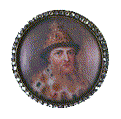 I shall
now give you a further description of the Czar. He is a goodly person, about six foot
high, well set, inclin'd to fat, of a clear complexion, lightish hair, somewhat a low
forehead, of a stern countenance, severe in his chastisements, but very careful of his
Subjects love. Being urged by a Stranger to make it death for any man to desert his
Colours; he answer'd, it was a hard case to do that, for God has not given courage to all
men alike. He never appears to the people but in magnificance, and on festivals with
wonderful splendor of Jewels and Attendants. He never went to any Subjects house but his
Governours when he was thought past all recovery. His Centinels and Guards placed round
about his Court, stand like silent and immoveable Statues. No noise is heard in his
Pallace, no more than if uninhabited. None but his Domesticks are suffer'd to approach the
inward Court, except the Lords that are in Office. He never dines publickly but on
Festivals, and then his Nobility dine in his presence. At Easter
all the Nobility and Gentry, and Courtiers kiss the Emperours hand, and receive
Eggs. Every meal he sends dishes of meat to his Favourites from his own Table. His stores
of Corn, and dry'd flesh are very considerable, with these he pays his Strelsies or Janzaries,
giving them some cloth, but very little money; for they have all Trades, and great
Priviledges.
I shall
now give you a further description of the Czar. He is a goodly person, about six foot
high, well set, inclin'd to fat, of a clear complexion, lightish hair, somewhat a low
forehead, of a stern countenance, severe in his chastisements, but very careful of his
Subjects love. Being urged by a Stranger to make it death for any man to desert his
Colours; he answer'd, it was a hard case to do that, for God has not given courage to all
men alike. He never appears to the people but in magnificance, and on festivals with
wonderful splendor of Jewels and Attendants. He never went to any Subjects house but his
Governours when he was thought past all recovery. His Centinels and Guards placed round
about his Court, stand like silent and immoveable Statues. No noise is heard in his
Pallace, no more than if uninhabited. None but his Domesticks are suffer'd to approach the
inward Court, except the Lords that are in Office. He never dines publickly but on
Festivals, and then his Nobility dine in his presence. At Easter
all the Nobility and Gentry, and Courtiers kiss the Emperours hand, and receive
Eggs. Every meal he sends dishes of meat to his Favourites from his own Table. His stores
of Corn, and dry'd flesh are very considerable, with these he pays his Strelsies or Janzaries,
giving them some cloth, but very little money; for they have all Trades, and great
Priviledges.